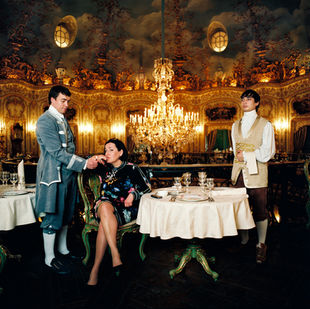NUOVELLES RUSSES
"It's funny to think of it now, but there was a time when I couldn't afford to spend 500 dollars on shoes"
Aizel Gusseinova, Businesswoman.
Russia is still on its feet today thanks to two natural resources - the first is oil, which funds a growing number of Russians to lead lives so lavish that it’s as though the Imperial party, so rudely interrupted in 1917, has found its second wind. The other natural resource isn’t gas, aluminum, or nickel – it’s women.
Not haut-couture Russian expats or mail order brides, but the cool-headed women who shepherded their children through the last twenty years, while their husbands drowned bad news with liters of vodka; and celebrated good news with liters of vodka.
According to some of them, even this hierarchy is under threat. ‘We are the driving force that has saved Russia, we are more precious than oil,’ declares Olga Sviblova, director of Moscow’s House of Photography, and one of the most formidable figures in the post-Soviet jet-set.
That leaves about 50 million heroines whose efforts have, to date, gone unrewarded.
There was, however, a lot of money to be made when the Soviet system collapsed and although money doesn’t smell, it does have a gender: masculine. A handful of businessmen, the oligarchs, made significant fortunes by stripping the state of its oil fields, its import monopolies and its industrial conglomerates. Fittingly, oligarch is a masculine word that describes an art with masculine attributes: an appetite for risk, a network fuelled by those in power, and an absence of scruples when it comes to eliminating competitors.
While the United Nations estimates that one in three Russians lives below the poverty line, today Moscow is home to 25 Dollar billionaires who are featured in the rich list of Forbes magazine. All of them are men, except for one: the wife of the Mayor.
What the Forbes list doesn’t mention are the dozens of Russian women who are busy building their own fortunes. They may be less wealthy than the oligarchs but the “Nouvelles Russes” are a unique breed, with extravagant spending habits, charity evenings, and flamboyant soirées in the capital’s best restaurants. It took considerable stamina to trail them for this story, and on more than one occasion we found ourselves at six in the morning after a night on the town, quaffing champagne with a beef stroganoff breakfast at the famous Café Pushkin.













